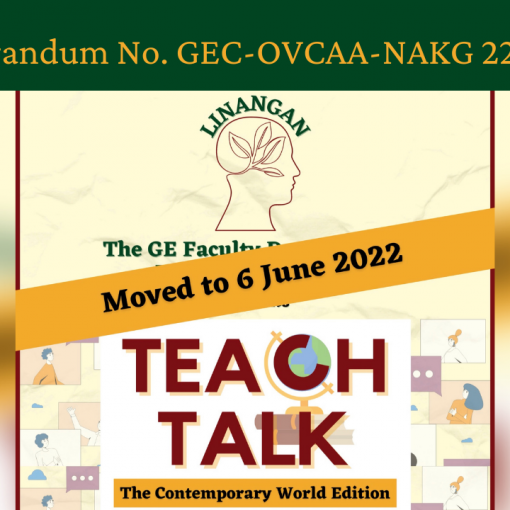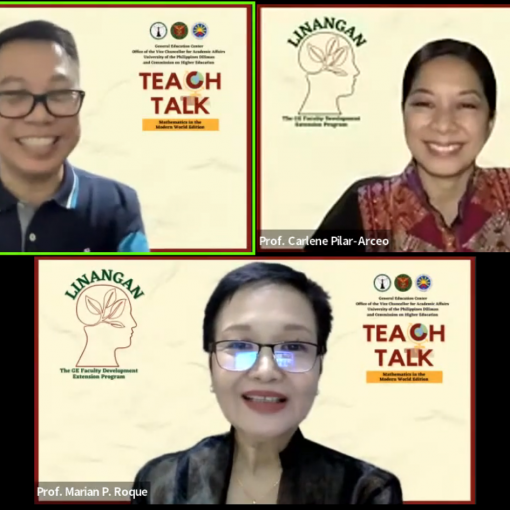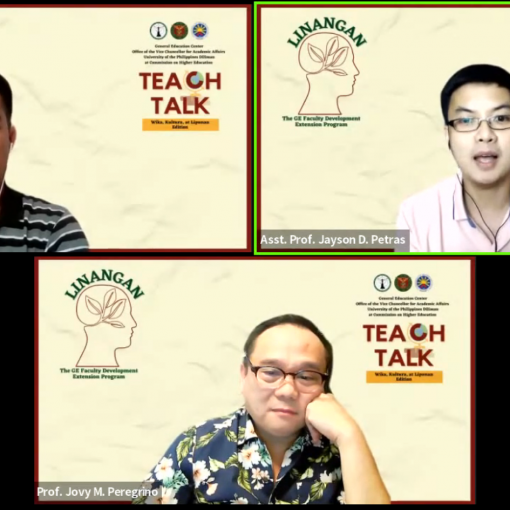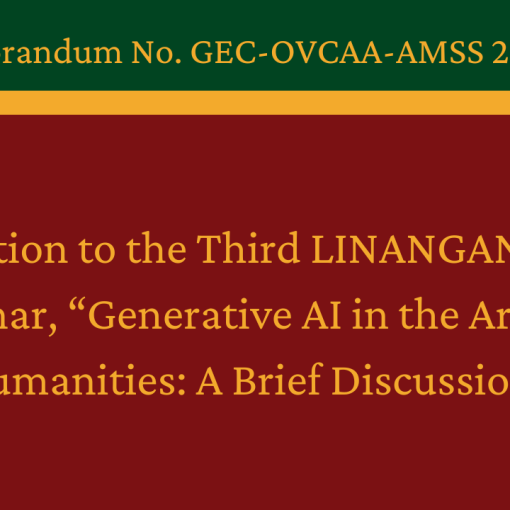The General Education Center Diliman conducted its second Teach Talk webinar series on Understanding the Self (UTS) and the UPD’s Self and Society 1 (SAS 1) GE course under the LINANGAN Faculty Development Extension Program. It was held last October 15 via Zoom with concurrent livestreaming on YouTube and Facebook, and attended by more than 1,700 participants from various higher education institutions around the Philippines.
UP Diliman Vice Chancellor for Academic Affairs, Prof. Maria Theresa T. Payongayong, formally welcomed the participants. She stressed that in fulfilling UP’s mandate as a leader in higher education and development, its course offerings should be quality assured, regularly updated, and shared with other colleges and institutions. To that end, LINANGAN webinars serve as an innovative way of sharing UP’s course offerings. Further, she highlighted the timely relevance of the webinar as it is important for teachers to know themselves, their capabilities and capacities, and their students.
Link to VCAA Payongayong’s opening remarks
Assoc. Prof. Josephine Dionisio, the then Chair of the UP Diliman Department of Sociology, presented key concepts and topics taught in the UTS course. At the beginning of her discussion, she characterized the Generation Z as digital natives, adept to using digital technology as well as preferring hands-on and individual learning. She also described the content of the course, contrasting it later with the discussion of UP System’s and Diliman’s SAS 1 GE course. She wrapped up her talk by presenting some online tools which she uses for her class, including Zoom, Google Jamboard, and Slido.
Complementing the first speaker’s discussion of the self is the talk given by Asst. Prof. Rosanne Echivarre of UP Diliman Extension Program in Pampanga and Olongapo. She focused on mental wellness and the self in the digital world. She defined key terms such as “mental health” and “mental health conditions”, and discussed mental health literacy among students. She also underscored the point that “how a young person uses social media and interprets the information presented” impacts the Gen Z’s experience of social media more than the usage itself. Finally, she stressed the need to guide students on spotting fake news, and to always look at the context of the students and the current issues of the nation.

The talks were followed by an open forum moderated by Prof. Ruth Lusterio-Rico of UP Diliman Department of Political Science. Among the key questions that surfaced are the issue of extending compassion to students, and alternative ways of reaching out to students. The speakers emphasized that the quality of education should be maintained, but leniency for some requirements should be practiced. Other important takeaways from the discussion are keeping an open mind, having a listening ear to students, and being observant as a way of bridging the generational gap between the students and the faculty. Participants also asked how they can be inclusive while teaching UTS or SAS 1, to which the speakers replied that there are many avenues for including diverse topics on the course.
LINANGAN: The GE Faculty Development Extension Program began last September 6 with the “Kasaysayan ng Pilipinas” webinar. The third webinar, “Vacc to School: Doing Blended Learning for GE Courses”, is set for November 15 with an aim to prepare GE faculty for the prospect of blended face-to-face and remote teaching and learning. Interested teachers may now register for the webinar here.
Meanwhile, participants who missed the October 15 webinar can now watch it here.




